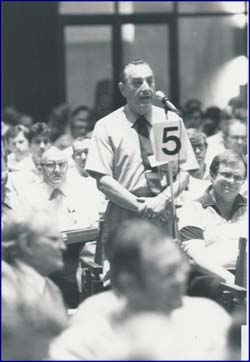 Gold Coast Presbytery (PCA), later renamed Southern Florida Presbytery, was organized on July 26, 1973, drawing churches primarily from the Everglades Presbytery of the Presbyterian Church in the United States. Upon organization, it was constituted of fourteen churches, with eleven minister and a communicant membership of over 5,600. Nine more pastors were added in 1974 and communicant membership rose to 6,000. With the addition in 1978 of the Coral Ridge Presbyterian church, the Presbytery of Southern Florida was for some time the largest Presbytery in the PCA. By 1998 there were a total of 29 churches in this presbytery and thirteen mission churches, shepherded by 109 ordained pastors, and a total communicant membership of 20,502.
Gold Coast Presbytery (PCA), later renamed Southern Florida Presbytery, was organized on July 26, 1973, drawing churches primarily from the Everglades Presbytery of the Presbyterian Church in the United States. Upon organization, it was constituted of fourteen churches, with eleven minister and a communicant membership of over 5,600. Nine more pastors were added in 1974 and communicant membership rose to 6,000. With the addition in 1978 of the Coral Ridge Presbyterian church, the Presbytery of Southern Florida was for some time the largest Presbytery in the PCA. By 1998 there were a total of 29 churches in this presbytery and thirteen mission churches, shepherded by 109 ordained pastors, and a total communicant membership of 20,502.
One of the churches in the Southern Florida Presbytery was Le Jeune Presbyterian Church in Miami, was pastored by the Rev. Robert C. Duhs. He and his congregation came into the Presbytery in the year following the Presbytery’s organization, and Rev. Duhs pastored this church from October of 1974 to March of 1977. The church had first been organized on January 7, 1946 as a mission church of the Shenandoah Presbyterian church, with thirty-eight charter members drawn from Shenandoah’s membership. Church services were first held from May of 1945 to January of 1946, at the Kinlock Park Elementary School, conducted by the Reverend D. Clyde Bartges. By 1949, the church was self-supporting. The cornerstone for the LeJeune congregation’s own home was laid and the building was occupied by late August of 1948. An education building was added in 1952 and a manse in 1954. Finally a new sanctuary was built and dedicated toward the end of 1965. Then in June of 1973, the congregation voted to leave the PCUS and so became one of the ten churches forming the Presbytery of Southern Florida within the Presbyterian Church in America. Le Jeune Presbyterian Church later merged with Grenada Presbyterian Church of Miami, on June 28th of 1984.
[pictured at right, the Rev. Robert C. Duhs, when serving as a commissioner to the Ninth General Assembly (1981) of the Presbyterian Church in America, as it met in Fort Lauderdale, Florida.]
Is God Your Father?
by Rev. Robert C. Duhs.
[as first published in The Presbyterian Journal, April 6, 1960, pages 7-8, 15.]
Is the doctrine of the Fatherhood of God and Brotherhood of Man Biblical?
Is God a Father to me? This is a basic spiritual question for it has to do with my hope of eternal life. If I can be sure that God is a Father in the benevolent, hopeful sense of that word, then I can have assurance of eternal life, the most important possibility in all the world.
A minister was once talking to his doctor. In the course of the conversation, he asked him, “Doctor, do you ever have difficult and rebellious patients?” The doctor replied, “Indeed I do. They come to me for help and then criticize my treatment and refuse to take medicine I prescribe.” “What do you do in such cases?” “Well, if they become too rebellious, I tell them to get another doctor.”
That story has spiritual implications. We come to God for a prescription of eternal life. But too often we have our ideas about how and on what conditions the prescription shall be given; and what it shall contain. Like the man without a wedding garment : in our Lord’s parable, we may cut ourselves off by insisting on coming as we want to.
One of the prescriptions which men have devised for their own salvation is that of the “Fatherhood of God and the Brotherhood of Man.” The doctrine expresses the theory that God is a loving, Heavenly Father to every man and that all men are equal, both socially and spiritually. Salvation belongs to the entire family of this loving, Heavenly Father, the human race, within which all members are brothers. Practically speaking there is no essential spiritual difference, in this scheme, between a Christian, a Jew, a Hindu, or a Buddhist, for God is Father to all men.
Now imbedded in this theory there is a germ of truth for we all are indeed creatures of the one sovereign Creator. But let us pause for a moment and reflect on the spiritual implications of the theory as it is generally understood. Is the spiritual “Fatherhood” of God and the spiritual “Brotherhood” of man an evident truth? Is it a reasonable thought? Is it Biblical?
To answer these questions we must have a starting point. If we can agree on the Bible as a starting point then we can search the Scriptures to see what it says on this issue. But what if we cannot agree on the starting point? Then we will only have what we have now — confusion. There must be a source of authority! And since the Bible is generally recognized as a source of authority in such matters, let us start with it.
I. STARTING POINT: THE WORD OF GOD.
What does the Bible say about the Fatherhood of God and the Brotherhood of Man? In Genesis 1:26, 27, we are told that man came into being by God’s direct act of creation: “And God said, Let us make man in our image, after our likeness … So God created man in His own image . .
It is our conviction, therefore, that God created man. Does this make God man’s Father? It certainly makes God his Creator, but for the sake of argument let us say it also makes Him man’s Father. Does this mean that man can forever claim salvation on the mere basis that God is his Creator or even his Father? If God is mankind’s Father, does that not carry with it certain prerogatives? And is it not logical to believe that one of those prerogatives is what inheritance He shall leave the children? Does a father have the right to divide his inheritance as he sees fit? Indeed he does. And the Bible repeatedly speaks of God “dividing to every man severally as He will.”
In other words, the Bible teaches that God is the Creator of all men; in a sense the Father of all. Now this Fatherhood encompasses the privilege of granting or cutting off the inheritance of those whom He has created. This is important to keep in mind. The Father determines who shall receive what inheritance.
II. THE UNITY OF THE HUMAN RACE
The idea of the unity of the human race lies imbedded in the Scriptures (our starting point). It is implied in man’s origin. Genesis 1:26-28 makes it clear that God created a single human pair, male and female, to become the embryo of humanity. We may conclude that all men have descended from this pair. At one time in history God divided mankind into different groups (Genesis 11) when He confounded their language and caused them to scatter, but men did not lose their identity, or their kinship to other men.
Therefore, we can say upon the authority of the Bible that all men are responsible to God. The true God must be worshiped in spirit and in truth by all men everywhere if they are to inherit eternal life. And please take note of that word “inherit” for it is a fact that men inherit eternal life; they do not earn it. God gives eternal life to those who meet His requirements.
III. MAN SEPARATES HIMSELF FROM GOD
If God created man, and if God is man’s Father, then He has the privilege and responsibility of showing man what is best for him. This is expected of earthly fathers; surely it can be expected of God. Now God does not shun His responsibility; He reveals to man what He expects of him if he is to inherit eternal life. He expects obedience—just what any father expects. Inheritance, blessing and guidance all hinge on obedience. Once a father has prescribed the rules his children must follow, he is not to blame if the child is cut off for disobedience.
When man disobeyed God, he violated his Father’s rules for inheritance, blessing and guidance. Because he sinned, he was cut off from eternal life. In Genesis 2:17 we read, “But of the tree of knowledge of good and evil, thou shalt not eat of it: for in the day that thou eatest thereof thou shalt surely die.” It is well known how man (the child) acted toward God’s (the Father) command. Paul sums it up in Romans 5:12-14, “Wherefore, as by one man sin entered into the world, and death by sin; and so death passed upon all men, for that all have sinned.” (This takes care of the fellow who says, “Don’t blame me for what Adam did.” God doesn’t have to blame us for what Adam did. We are sinners too.)
Through the law of heredity, human depravity has passed from generation to generation and upon all men. In other words, the idea of the “Fatherhood of God and the Brotherhood of Man” does just the opposite from what most men think in reality, by relating us inseparably to Adam, it condemns rather than saves.
IV. THOSE WHO HAVE ETERNAL LIFE
According to the Bible (our starting point), only those who love God’s Son have the promise of eternal life. God the Father, who took away eternal life because of disobedience, now grants it back to those who, in obedience to His Word, are changed by the new life which is in Christ Jesus. In John 8:34, we read, “Jesus answered them, Verily, verily, I say unto you, whosoever committeth sin is the servant of sin.” He then adds in verse 36, “If the Son therefore shall make you free, ye shall be free indeed.” To deny the Son is to remain cut off from the Father. We are made children of God by faith in Jesus Christ. In John 8:42, Jesus said, “If God were your Father you would love Me, for I came from God.”
There is only one way for us to return under the Fatherhood of God and that is through our love for the Son of God, Jesus Christ. If a man does not receive Jesus Christ, God gives him up (a prerogative which is His as Father).
Jesus also declared in John 8:43, 44, that the man who will not hear His Word, is a member of the devil’s family — “Ye are of your father, the devil.” Jesus, in short, declared that some cannot call God, “Abba,” or Father.
One becomes a child of God, with restoration to the inheritance of eternal life, only by trusting in Jesus Christ (John 8:36); that is, by receiving and acting upon His Word (John 8:45-47).
Therefore, on the basis of Scripture we conclude that the doctrine of the “Fatherhood of God and the Brotherhood of Man” points to our natural condemnation rather than our natural salvation outside of Christ. Only in Christ is the natural brotherhood of man, in the sense of humanity’s universal condemnation, mitigated by the adoption of some men as re-generated children of God. We truly become brothers only in Christ.
We also conclude from Scripture that God becomes our spiritual Father only as we love Jesus Christ Who came from God to save us from our sins.
V. THE NEIGHBOR – RELATIONSHIP
Now in addition to the selective relationship of brother, there is another, truly universal relationship, that of neighbor. Once we have become a child of God through faith in Jesus Christ, we see all men — even those who are not our brothers in Christ — in a different light. For by nature all men are neighbors and towards our neighbors we owe an obedience. In the parable of the “Good Samaritan”, found in Luke 10:25-37, we are told what it means to “love our neighbor as ourselves,” according to the Levitical commandment.
Who is my neighbor? It is any man who stands in need. Our neighbor is not our blood relation only, not just the circle of our acquaintances, not just our countrymen, not just our brethren in Christ, but every human being whom we can help. And what greater help does any man outside of Jesus Christ need than to be introduced to the only One who can save his soul!
This is the commandment of love, but although it recognizes that we are all neighbors, it does not make us all brothers. However, it does make us aware of our neighbors and of their need for salvation. How can a man be a member of the Kingdom of God and not be interested in the souls of men? Just because lost men are not our brothers in Christ does not mean that we must not be interested in them — we are to love them, for they are our neighbors. How can a man love God with all his heart, and with all his strength, and with all his mind, and have no concern for his neighbor who knows not God? He cannot, and that is why Jesus gave us this parable — that we might see the need of our fellowmen and be inspired to help them.
Once we become Christians, we become partners in the Divine interest God has in mankind. We want our neighbor to know the Christ who alone can save, and to do that we must love him as we love ourselves. “Thou shalt love thy neighbor as thyself,” are very searching words, for few, if any, ever have a real falling out with themselves.
We love our neighbor, not only because it is the Christian thing to do but because it may lead to his conversion. When we speak the Truth to him in this love, the occasion is provided for the Holy Spirit to enter in and regenerate him. Then he be-comes more than a neighbor, he becomes a brother.
The theory of the “Fatherhood of God and the Brotherhood of all men” is false. But the doctrine of the “Fatherhood of God and the Brotherhood of new men in Christ,” by Grace is true!
Meanwhile, brothers in Christ are to love their neighbors as themselves. In so doing they seek to reach the lost with the saving Gospel of Jesus Christ.
* * * * *
At the time when this was published, the Rev. Mr. Duhs was pastor of the Westminster Presbyterian Church in Vicksburg, Miss.

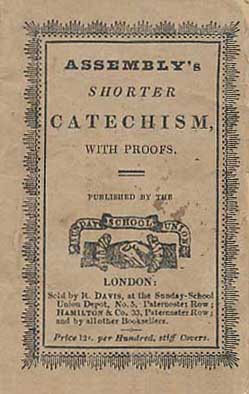 There has always been a plurality of definitive books explaining its matchless answers for Presbyterians. The books this author has in his personal library on the Shorter Catechism are the following: Thomas Watson: A Body of Divinity, The Ten Commandments, The Lord’s Prayer; Thomas Vincent: The Shorter Catechism Explained from Scripture; Alexander Whyte: The Shorter Catechism; John Whitecross: The Shorter Catechism Illustrated from Christian Biography and History; and a modern book, G.I. Williamson of The Shorter Catechism, Vol 1 & 2. These have all been effective in teaching and training both children and adults, especially the officers of the local church. I would like to commend to our readers the practical influences of this Shorter Catechism in this post.
There has always been a plurality of definitive books explaining its matchless answers for Presbyterians. The books this author has in his personal library on the Shorter Catechism are the following: Thomas Watson: A Body of Divinity, The Ten Commandments, The Lord’s Prayer; Thomas Vincent: The Shorter Catechism Explained from Scripture; Alexander Whyte: The Shorter Catechism; John Whitecross: The Shorter Catechism Illustrated from Christian Biography and History; and a modern book, G.I. Williamson of The Shorter Catechism, Vol 1 & 2. These have all been effective in teaching and training both children and adults, especially the officers of the local church. I would like to commend to our readers the practical influences of this Shorter Catechism in this post.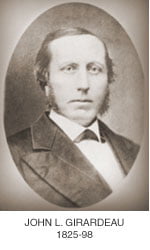 According to a longtime friend of the Rev. John L. Girardeau, it was about this time that “[Girardeau] began to receive overtures from the Presbyterian young
According to a longtime friend of the Rev. John L. Girardeau, it was about this time that “[Girardeau] began to receive overtures from the Presbyterian young 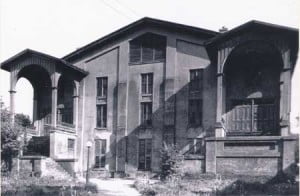 Girardeau wasted no time
Girardeau wasted no time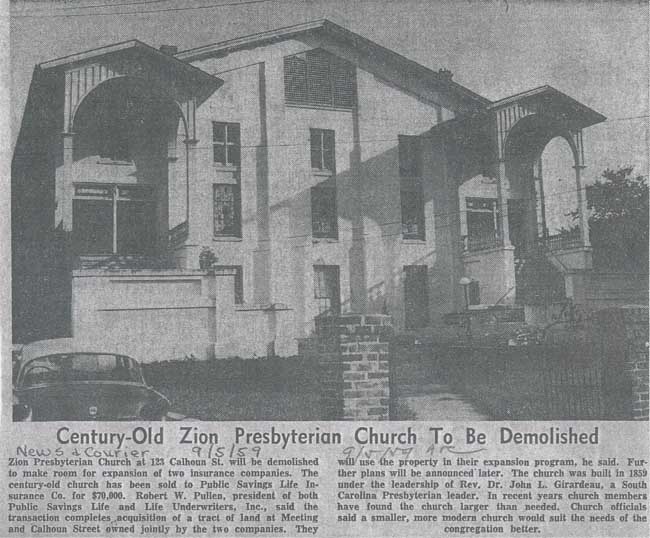
 Gold Coast Presbytery (PCA), later renamed Southern Florida Presbytery, was organized on July 26, 1973, drawing churches primarily from the Everglades Presbytery of the Presbyterian Church in the United States. Upon organization, it was constituted of fourteen churches, with eleven minister and a communicant membership of over 5,600. Nine more pastors were added in 1974 and communicant membership rose to 6,000. With the addition in 1978 of the Coral Ridge Presbyterian church, the Presbytery of Southern Florida was for some time the largest Presbytery in the PCA. By 1998 there were a total of 29 churches in this presbytery and thirteen mission churches, shepherded by 109 ordained pastors, and a total communicant membership of 20,502.
Gold Coast Presbytery (PCA), later renamed Southern Florida Presbytery, was organized on July 26, 1973, drawing churches primarily from the Everglades Presbytery of the Presbyterian Church in the United States. Upon organization, it was constituted of fourteen churches, with eleven minister and a communicant membership of over 5,600. Nine more pastors were added in 1974 and communicant membership rose to 6,000. With the addition in 1978 of the Coral Ridge Presbyterian church, the Presbytery of Southern Florida was for some time the largest Presbytery in the PCA. By 1998 there were a total of 29 churches in this presbytery and thirteen mission churches, shepherded by 109 ordained pastors, and a total communicant membership of 20,502.